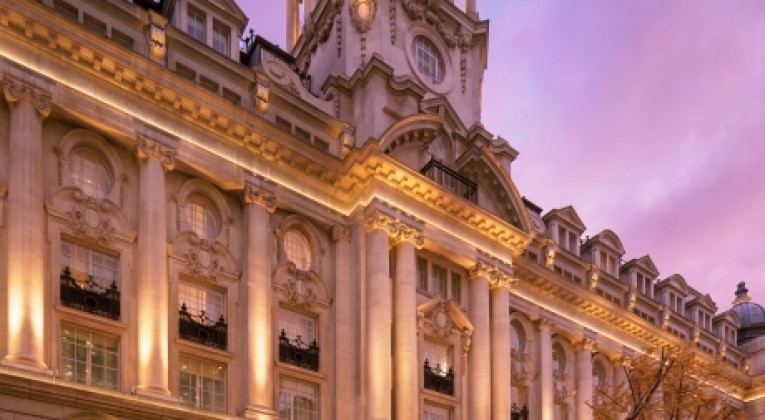Some links to products and partners on this website will earn an affiliate commission.
Skift reports that InterContinental Hotels Group (IHG – one of the largest hotel groups in the world) – is looking to buy a new luxury brand this year,
(IHG CEO Keith Barr stated) “We are very focused on the sweet spot of acquiring an asset light, small luxury brand company or companies with a strong customer proposition, [and] strong owner proposition that we can grow…
“There are a number of those located throughout the world right now that we’ve had conversations with…”

This is interesting for a few reasons – partly because it demonstrates the clear industry trend towards further consolidation in terms of the number of companies and the increasing variety of brands within those companies; but also because it perhaps reflects an appreciation that IHG’s only existing ‘luxury’ brand – InterContinental – doesn’t appeal to as many luxury travellers in 2018 as IHG might like.
While the hotel industry in general is getting far too worked up about the supposedly unique needs and desires of ‘millennials’, it’s certainly fair to say that there are substantial market segments which aren’t particularly attracted to the InterContinental brand.

What really drew my attention though was the specific nature of what IHG is looking for: small and asset-light luxury brands.
In the context of the hotel business, ‘asset-light’ is the term used to describe a business model where the hotel companies own relatively few (or none) of the physical hotels that carry their brand names. Instead, the hotels are owned by all sorts of different investors and developers, who then pay a management fee (and/or franchise fee) to the hotel company and conform to certain brand standards, in order to operate under the badge of a particular brand. This is now how most of the big hotel companies operate, with IHG directly owning fewer than 10 of the 5,000+ hotels that its brands cover.
Given IHG’s business model, it’s hardly surprising that if they are looking to acquire new brands, the company would prefer them to also be asset-light. The interesting question is, which (unattached) luxury hotel brands fit the description?

This is where it gets tricky, because many small luxury brands operate relatively asset-heavy models – it gives them more control over the guest experience. This has been changing a bit over the last few years, but it’s still broadly the case. Let’s take a look at a few examples to show you what I mean:
Mandarin Oriental (MO) has 29 hotels and only 10 are directly owned (which sounds quite asset-light) – but as of December 2016, 84% of net income (EBITDA) came from those 10 hotels. To be fair, MO is pursuing expansion via management contracts, so if you include what’s in the pipeline, maybe MO would fit the description? I’m not convinced.
Shangri-La is in the same situation as MO, but is even more asset-heavy. I also think it might be a bit too big for what IHG is looking for, with over 100 hotels.

Peninsula Hotels could be a great fit in theory, but is extremely asset-heavy, so doesn’t sound very likely based on the comments from IHG.
Belmond is not asset-light but looks the right sort of size in terms of the number of hotels. (EDIT: The Times has reported that IHG are making advances on Belmond, despite the company being far from asset-light)
Four Seasons certainly fits the asset-light description, but is it too big?

Rosewood is asset-light, not too big, has hotels in (what I consider to be) the ‘right’ locations, and would provide a ‘real luxury’ edge to IHG. Whether Rosewood Hotel Group would be willing to sell just the ‘Rosewood Hotels and Resorts’ brand though, without having Pentahotels and their other brands included in the deal, I don’t know…
I’m not really sure what might be on the cards, but it’s fun to speculate! If I had to guess, I’d say Belmond and Rosewood look like possibilities, whereas the others would be more surprising for one reason or another. What do you think the likely options are – and what would you like to see?
Are there any obvious candidates that I’ve not considered? (Almost definitely!).




Travel hackers do seem to love playing M&A banker when it comes to hotel chains. 🙂
Hopefully none of those chains end up within IHG Rewards Club. Hyatt on the other hand… 😉
Haha – absolutely! Who’s your money on?
You say that, but I certainly wouldn’t say no to using my mastercard free night certificate at some of these! 🙂
This decision makes perfect sense really – I was Spire last year through stays, but got so bored of the total lack of luxury IHG hotel options (I think IC Hong Kong might literally be the only IHG hotel I’ve ever stayed in that would count as a luxury hotel) that I let it drop back to nothing this year as I moved all my stays to SPG and Hilton where possible.
Hopefully IHG won’t acquire a luxury chain I actually like and then I won’t regret the decision. Wonder what happens to Ambassador if IHG buys a more premium brand than IC. My guess would be they’d be targeting Hyatt – just not sure it would make sense for some like Rosewood or Shangri-La to sell to IHG.
‘
Yeah – I’m not even sure I’d rate the IC Hong Kong as ‘real luxury’. It’s definitely nice (and a few others are grand dames like Paris, Amsterdam, Washington DC, etc), but there’s nothing exciting about even the best InterContinentals really. Take the IC Park Lane for example – it’s good, but I genuinely prefer the CP City and there’s no way I’d pay more in cash or Points for the IC.
Interesting point re Ambassador – not something I’d considered until now.
I think Hyatt are too big for IHG to swallow and a lot of the pipeline growth there is more in Hyatt Place/Hyatt House/Hyatt Centric rather than Park Hyatts.
From a personal standpoint I’d love it to be Rosewood – which could well be clouding my judgement of course!
Agree Hyatt is a bit big to be easily digestible, but it would make pretty good strategic sense in the same way as Marriott/SPG; frankly, if any of the big chains bought Hyatt I would instantly consider moving all my stays to them, the only reason I don’t chase Hyatt status currently is the footprint is too small / it’s just too difficult if you’re not based in the US. Just had a fabulous stay at Park Hyatt Melbourne this week when the hotel didn’t even look that good on paper, the really top end Park Hyatts (NYC/Tokyo etc.) are like almost nothing else in a major hotel chain.
Totally agree – if it was ‘proper’ deal IHG were looking for then Hyatt would make perfect sense in theory. And, as you say, loyalty to Hyatt itself is more or less impossible for most people in Europe (with the honourable exception of Craig, who I believe is still on track for Globalist this year?). From what I’ve read though, it seems like IHG are focusing on more targeted acquisitions and creating even more new brands themselves (at least for the time being).
In a post-Marriott/SPG world though, I imagine Hyatt will be involved in some sort of deal with a big player eventually.
Also with regards to playing M&A banker, one can be both a travel hacker and an M&A banker, believe it or not 🙂
Haha – I suspect there could be a fair bit of overlap. It’s all about discerning value ultimately, right? 🙂
Exactly, pretty sure both appeal to an analytical mindset! And it’s nice to feel like you’ve ultimately won vs. the other side (within sensible limits) in both 🙂
The people I “used to know” in M&A also work 60-80 hour weeks and are extremely well paid. Positioning to Stockholm and churning Amex cards are pretty low on their list of ways to spend their limited free time!
Churning Amex cards yes, too much effort for too little gain, given I’m currently sat in the lounge at ARN having flown back in QR F, you’d be surprised in terms of positioning, however 🙂
Even in the world of M&A, I’d highly recommend the occasional card churn – 2 mins to cancel a card, 10 seconds to make a calendar note to reapply in 6 months, 2 minutes to reapply, 30 seconds to activate = less than 5 minutes (all of which can be done while doing something else/travelling/waiting/etc), for ~22,000 Amex MR Points as an example. That’s surely £200 of ‘value’ even for people who don’t really know how to use them very well, which seems like a pretty good return on 5 minutes of otherwise dead time. Get 4 cards a year = £800 of value – tax free of course too, so the cash equivalent is substantially more – particularly for higher rate/additional rate payers.
Of course, you could also make the argument that Points/Miles are actually worth far more in real terms to people who regularly spend hard cash on Biz/First Class, because the genuine saving in that situation is much more substantial.
60 hours a week isn’t so bad! – 80 is pretty rough though.
Kempinski Hotels ?
Not sure about Kempinski, but Loews is still pursuing an avowedly asset-heavy strategy as far as I know so unlikely to be them.
A quick googling suggests that almost all Kempinski hotels are under management contracts, so it could work.
Loews ?
The Times reporting that this was Belmond…
Has the author actually read any of Belmond’s annual reports? Asset light??? Seriously?
Fair Point MBeck – I hadn’t. I made assumptions off what was written elsewhere about Belmond and in particular the industry speculation re IHG (since corroborated by The Times) crossed with the IHG CEO’s comments on what IHG is looking for.
You’re absolutely right though – having now had a look through the latest annual report myself, even if you include what’s in the pipeline and the increasing use of management contracts, Belmond is still basically the opposite of asset-light. A bad error on my part and one which has now been corrected – many thanks for the correction!
Interesting that it does look like IHG want Belmond, given what Keith Barr said.